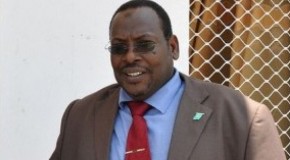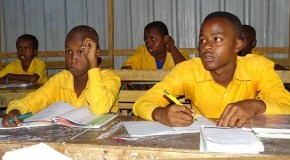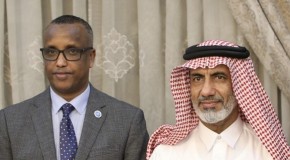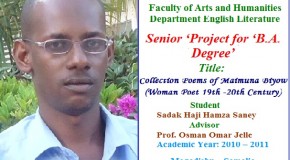H.E Dr s. Mariam Aweis Jama Minister of Family affairs, Somali Transitional Federal Government (TFG) Speech
Mariam Aweis Jama
Bismillaahi Rahmani Rahim
Mr. Chairman, Ladies Gentlemen
Good afternoon and Asalamu Aleikum Warhmatullahi Wabarakatu
It is a great honor for me to participate in this important conference on behalf of the people and the government of Somalia. I would like to take this opportunity to present the great role of Somali women in promoting peace.
Since the central government collapsed, Somalia has been rightly pronounced as a failed state. The country has experienced massive movements of refugees and internally displaced people, which have generated complex humanitarian grievances, a sharp economic decline that spurs famine, drought and an ongoing deterioration of public services.
According to Islam, peace promotion is an act of goodness and people are encouraged to resolve their differences. African traditional societies assigned to women the role of educator, such education of the type that started from the cradle and was achieved by means of a variety of activities in which the children participated. The most general implication is the understanding that peace is not born but made through responsible upbringing and socialization, undertaken and supervised by mothers. Indeed the central message here is that the mother is the first and most valuable school in life and peace.
In Somalia, civil society organization led by women has achieved much in the past two decades. They ensured civil society representation, which is essential to any peace and reconciliation process, they strongly disempowered the warlords; they also reduced the significance of clan affiliation.
Somali women are effective in influencing elders and others to intervene in conflicts and have mobilized resources to finance peace meetings and support demobilization, while men typically focus on achieving a political settlement. Somali women have also led the way in mobilizing the society for engagement in peace work, although only some of their initiatives for peace have been documented.
But generally Somali women still face constraints in breaking through gender based inequalities, cultural and practical barriers to equal political participation. The collapse of the state meant that they also lost the legal status and equal rights that had been afforded them. While women have actively engaged in peace building, the gendered nature of clan-based politics means that women are typically excluded from full participation in peace talks.
Women and girls seeking refuge at displacement camps must walk for days along the long and dangerous routes to the Somalia border. They arrive in North-eastern Kenya traumatized not only by famine and displacement but also from being raped along the way. Women and girls are especially vulnerable when they venture out in search of firewood for cooking which is putting them at greater risk of rape.
It is a pleasure for me to inform you with great certainty that for the first time in two decades the residents of the Somali capital are now enjoying a measure of relative peace and stability. This success has created an opportunity to reach the most vulnerable people and to extend government services to them.
The TFG has started implementing a new roadmap for a new constitution and subsequent elections by August 2012. This was a historic moment for Somalis as the consultative process ended in unity and harmony. The government is committed to implementing this with a view to making a difference for the Somali people.
I appeal to all Somalis to take part in this process. We are embarking on a new era of making a difference to our people. I urge our key partners and friends in the international community to provide timely resources to help us achieve our ambitious targets.
We need to consolidate recent progress on security, reconciliation and political out reach. This is the best time to implement the roadmap and at the same time to bring peace and stability to Somalia.
In order to brief you I would also like to inform you that there is on-going server drought and famine which unfortunately affects more than half of the Somali population in the southern part of Somalia. Children are dying at the rate of 10 every minute and after them women and elderly people are the most affected. Families are still leaving their homes and villages for the capital city in order to survive. Animals are dying because of the shortage of water.
Concerning this situation, allow me to appeal to the international community and well-wishers to stand strong to help the Somali people in order to overcome this tragedy.
My requests to the Swedish Government:
(1)Sweden is one of the government that most supported Somalia in becoming independent and getting a democratic Somali government through peace and reconciliation conferences. Swedish-Somali organizations are among the leaders in organization the building of hospitals, schools and other development centers. I request on behalf of the government of Somalia, that the Swedish Government continues supporting Somalia and recognizes the passport issued by the Somali Government.
(2)Support the process of the draft constitution so that women can get their quota for political seats.
And finally I hope this conference will unite the entire Somali nation and will encourage it to overcome its differences and maintain peace.
Insha Allah
May God bless Somalia and all of us!
Abdirashid Abdullah Haidar
Rashiid123@gmail.com
www.jiinwebi.net
Mogadisho Somalia






















Comments are closed.